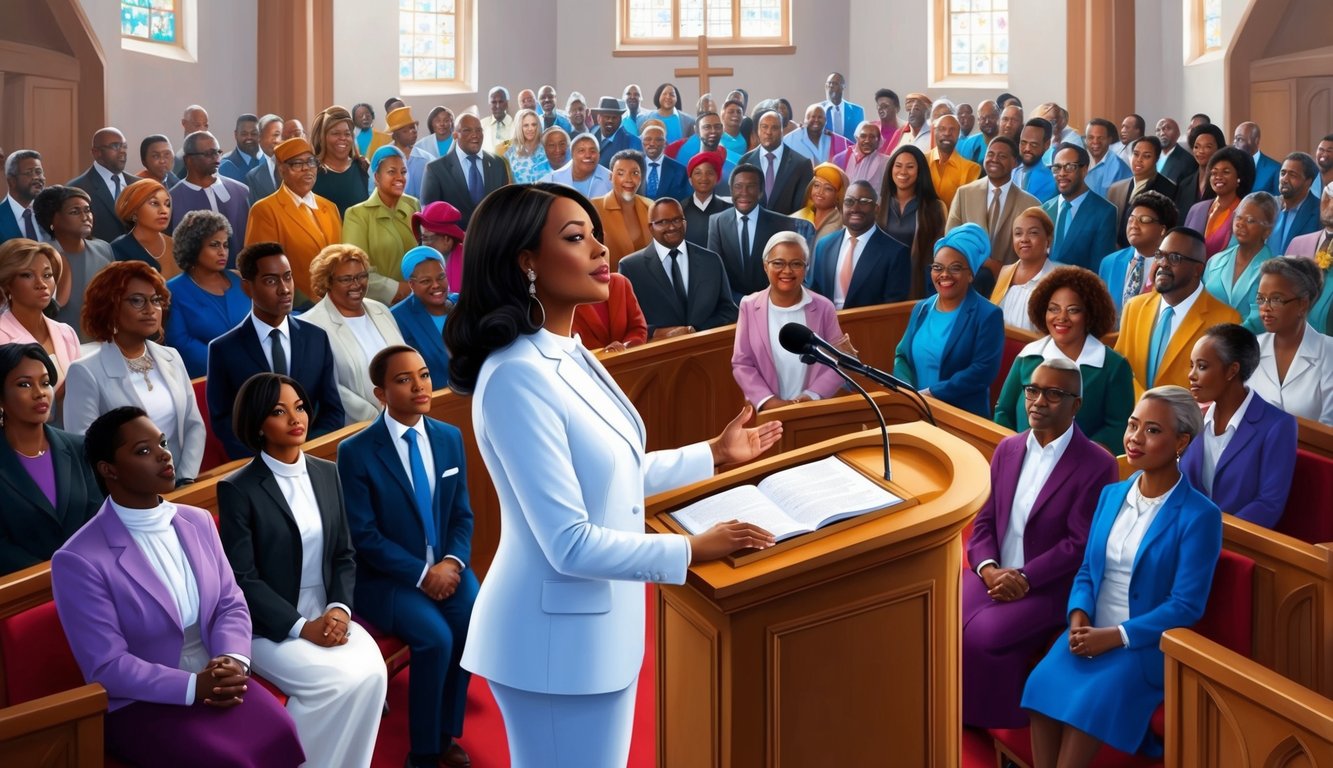Don’t Miss Out On This Unique Astrological Opportunity
Are you tired of spinning your wheels and getting nowhere? Simply put, you’re out of sync: you’re out of alignment with your astral configuration.
But: there’s a kind of map that can help you reclaim your alignment. Think of it as your own personal blueprint to success and happiness: a blueprint that will help you live your most amazing life.
Get started here.
The question of whether women can be pastors often stirs many debates and discussions among church communities.
Some interpretations of the Bible suggest that women are not restricted from roles such as teaching children.
However, they are often debated over their role as pastors due to spiritual authority over men.
This viewpoint is based on specific passages, but other perspectives argue for a broader understanding of pastoral leadership that includes women.
Looking back at the early church, women played significant roles in ministry.
This suggests that rigid restrictions may not align with all historical practices.
You might find yourself considering not only biblical teachings but also the cultural and practical reasons that matter in today’s church settings.
Exploring theological perspectives and practical implications can offer valuable insights into this topic.
Depending on where you stand, the arguments put forth could reshape your view on the role of women in church leadership.
Key Takeaways
- Some argue the Bible restricts women from being pastors.
- Women had key roles in the early church.
- Modern views vary on women pastors.
Biblical Foundations of Pastoral Ministry
The idea of women in pastoral roles sparks many discussions.
This section touches on examples from both the Old Testament and New Testament that are relevant to this topic.
Old Testament Precedents
In the Old Testament, there are strong women who held leadership roles. Deborah served as both a judge and prophet, showcasing that God can call women to lead. Miriam, the sister of Moses, played a significant role as a prophetess and leader during the Exodus. Huldah was another prophetess who was consulted by religious leaders.
These stories provide examples of women leading and guiding communities in spiritual matters.
Their roles suggest that God’s call isn’t limited by gender. Scripture highlights their leadership and validates their positions as pivotal figures in biblical history.
New Testament Teachings
The New Testament discusses women’s roles through teachings from Jesus and the Apostle Paul. 1 Timothy 2:12 and 1 Corinthians 11 are often cited in these discussions.
However, the New Testament also mentions women like Priscilla and Phoebe, who were involved in ministry and supported the Gospel.
Priscilla was known for teaching alongside her husband, Aquila, and co-authoring the Epistle to the Hebrews according to some traditions.
Phoebe is referred to as a deacon in the church.
Her role signifies the early church’s recognition of women’s contributions.
These examples indicate that women held notable and active roles in sharing God’s message.
The Role of Women in the Early Church
Women held key positions and played essential roles in the early Church, contributing significantly to its growth and development.
They took on leadership roles and served as spiritual guides, showing that women were valued and influential in the spread of Christianity.
Women in Leadership Positions
Women like Priscilla took on leadership roles during the early days of Christianity.
They were not just passive attendees but were active in teaching and guiding others.
In the New Testament, Priscilla is mentioned alongside her husband, Aquila, as a teacher of Apollos, an important preacher in the early Church.
Phoebe is another notable figure, recognized in the Book of Romans by the Apostle Paul.
She was referred to as a “deacon” or “minister,” indicating her role in serving the Church and leading others.
These women exemplified the diversity of roles available to women, from teaching to pastoral care.
Historical Examples of Female Spiritual Leaders
Women like Mary and Lydia also held significant influence.
Mary, the mother of John Mark, opened her home for early Christian gatherings, as detailed in the Book of Acts.
Her home became a center for prayer and teaching.
Lydia, a businesswoman from Ephesus, was one of the first converts in Europe and played a significant role in supporting the ministry.
The leadership of women wasn’t limited to informal settings.
Historical accounts show women as leaders and contributors to theological discussions.
These examples demonstrate that women were not merely supporters but also leaders who shaped early Christianity through their contributions and spiritual guidance.
Theological Perspectives on Women as Pastors

The topic of women as pastors is debated among Christians with different views based on theology and scripture.
Key discussions revolve around the roles of teaching and authority in the church and interpretations of specific Bible passages.
Egalitarian vs. Complementarian Views
Egalitarians believe that men and women are equal in all aspects, including roles within the church.
They emphasize Galatians 3:28, which states there is neither “male nor female, for you are all one in Christ Jesus.” This view supports gender equality in leadership positions.
Egalitarians argue that historical and cultural contexts in biblical times should be considered and that the message of Ephesians 5 points toward mutual submission among believers.
Complementarians, on the other hand, assert that God created men and women with different, complementary roles.
They often cite the Creation Ordinance and refer to 1 Timothy 2:11-12, where Paul mentions that women should not teach or have authority over men.
In this view, the differences in gender roles reflect a divine order established from the beginning with Adam and Eve.
Interpreting Key Scripture Passages
Interpreting passages such as 1 Timothy 2:11-12 is central to this debate.
Some believe that Paul’s instruction against women teaching directly applies today, interpreting it as a restriction on women having authority in preaching.
Others argue that Paul’s words were meant for a specific cultural and historical context, not as a universal rule.
The passage from Galatians 3:28 is often cited to support the belief that there is no gender distinction in roles within the church.
This passage is crucial for those advocating for ordination of women.
Different denominations might interpret these scriptures variably, impacting their stance on women pastors.
Thus, biblical interpretation plays a significant role in shaping views on women’s roles in church leadership.
Practical Considerations for Today’s Church

When considering the role of women as pastors, churches need to focus on how social and cultural dynamics impact the acceptance and success of women in leadership roles.
It’s also crucial to consider the ways you can support and empower women in ministries effectively.
Addressing Social and Cultural Dynamics
Social and cultural norms can greatly impact the perception and acceptance of women pastors.
In many communities, traditional views may challenge the idea of women in leadership roles within the church.
Denominations are starting to recognize these changes, fostering inclusivity by encouraging dialogue about women’s roles.
Understanding the influence of societal expectations, past norms, and present attitudes can help align church practices with the current dynamics.
Churches may need to address concerns related to family responsibilities, balancing home and ministry, and how these intersect with leadership tasks.
You can drive positive change by focusing on educating congregations about the historical and biblical precedence for women in ministry, promoting open discussions about conventional gender roles, and fostering a culture of equality.
Supporting Women in Ministry
Supporting women in ministry involves not just acknowledging their potential but actively promoting and empowering them within pastoral roles.
You can begin by creating mentorship programs and offering educational opportunities to equip women with necessary pastoral skills.
Encourage women by offering them diverse roles in leadership, from senior pastor positions to other vital leadership roles within the church.
Providing resources and establishing support networks can strengthen their ministry.
Church leadership should actively engage women in decision-making processes and offer platforms for them to express their visions.
By doing so, you ensure that their voices are heard and valued, opening avenues for more women to consider pastoral ministry and leadership roles.
This inclusivity fosters a more balanced and representative church environment, where diverse perspectives contribute to spiritual and community growth.
Encouraging women to take on leadership roles can also inspire meaningful discussions about responsibilities within the church, such as what does a deacon do and how various leadership positions support the congregation.
By creating mentorship programs and leadership training, churches can equip women with the necessary skills and confidence to take on pastoral and administrative roles.
Frequently Asked Questions

Exploring the role of women as pastors involves looking at biblical perspectives, denominational practices, and historical contexts.
Understanding these facets helps you navigate the diverse views and practices within Christianity today.
What does the Bible say about women serving as pastors?
The Bible contains passages that are interpreted in different ways regarding women pastors.
Some point to 1 Timothy 2:12 as a restriction, while others note that women can hold various roles like teaching other women or children as seen in Titus 2:3-5.
Are there any denominations that officially recognize women in pastoral roles?
Yes, several denominations officially recognize and ordain women as pastors.
Denominations like the United Methodist Church and the Evangelical Lutheran Church in America allow women to serve in pastoral roles.
What is the historical context of women serving in church leadership?
Historically, the role of women in church leadership has evolved.
In early Christianity, there were instances of women serving in important roles, but over time many traditions restricted these roles.
The modern era has seen a gradual shift towards inclusivity.
How do congregations typically respond to the appointment of a female pastor?
Reactions can vary among congregations.
Some embrace female pastors, celebrating inclusivity and diversity.
Others may have reservations due to traditional beliefs.
The response often depends on the church’s theological stance and cultural background.
What are the arguments for and against women’s ordination in the church?
Arguments in favor of ordaining women include promoting equality and recognizing the spiritual gifts of women.
Those against may cite traditional interpretations of scripture or long-standing church traditions.
Both sides feel strongly about maintaining the integrity of their beliefs.
In what ways can a woman serve in a church if not as a pastor?
Women have many ways to serve in a church beyond the role of pastor.
They can lead worship, teach Bible classes, work in outreach and missions, or offer counseling.
These roles allow women to contribute significantly to their communities and congregations.



